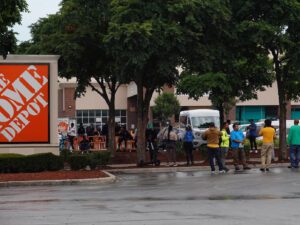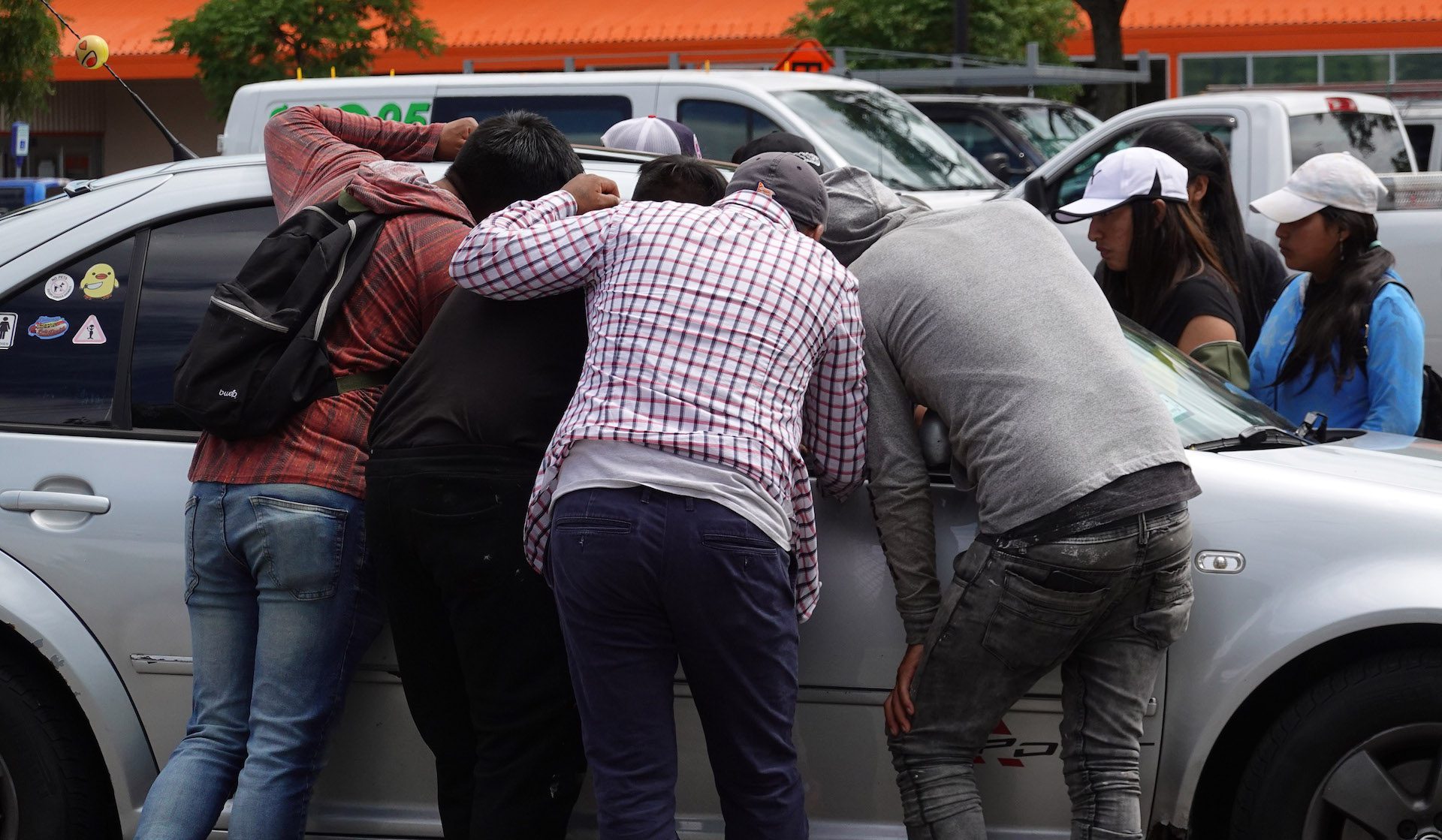 Abel Uribe for Borderless Magazine
Abel Uribe for Borderless MagazineNewly arrived immigrants search for work as day laborers outside home improvement stores across Chicago. Many find few opportunities and precarious work conditions.
Squeezed among the other day laborers, Juan’s eyes scan like a searchlight.
Here’s a truck. It stops. Men dash up, tightly surrounding it as they lean into its windows, offering themselves up for work. Only one guy gets hired and the truck zips off.
Now, another truck, then a car, and then another car as the crowd of workers, nearly all recent immigrants from Ecuador, slowly dwindles.
News that puts power under the spotlight and communities at the center.
Sign up for our free newsletter and get updates twice a week.
A middle-aged woman pulls up in a Tesla and signals to two teens who come running. She needs them to dig a trench and will pay $150 for the day plus lunch, she says. They drive off with her.
But Juan is left on the corner, watching restlessly for a job as the morning ticks away. No work for the last four days means less to live on and less to send home to his wife and three children in Ecuador.
While friends have moved on to other places across the U.S. — discouraged by the lack of work in Chicago — the 31-year-old is staying put. He comes from a small town of mostly indigenous Ecuadorians, who like himself speak Quichua as well as Spanish.
“I’m an optimist,” he says slowly and thoughtfully in Spanish. “Whether here or in my own country, I have to find work. I’m giving myself three years. If I haven’t succeeded, I’m going back.”
Juan said he needs to earn at least $1,400 a month to cover his expenses here and at home in Ecuador.
And so, many like Juan, gather on the edges of Home Depots across the city, where day laborers have long tried to find work in Chicago. He asked that his full name not be used.
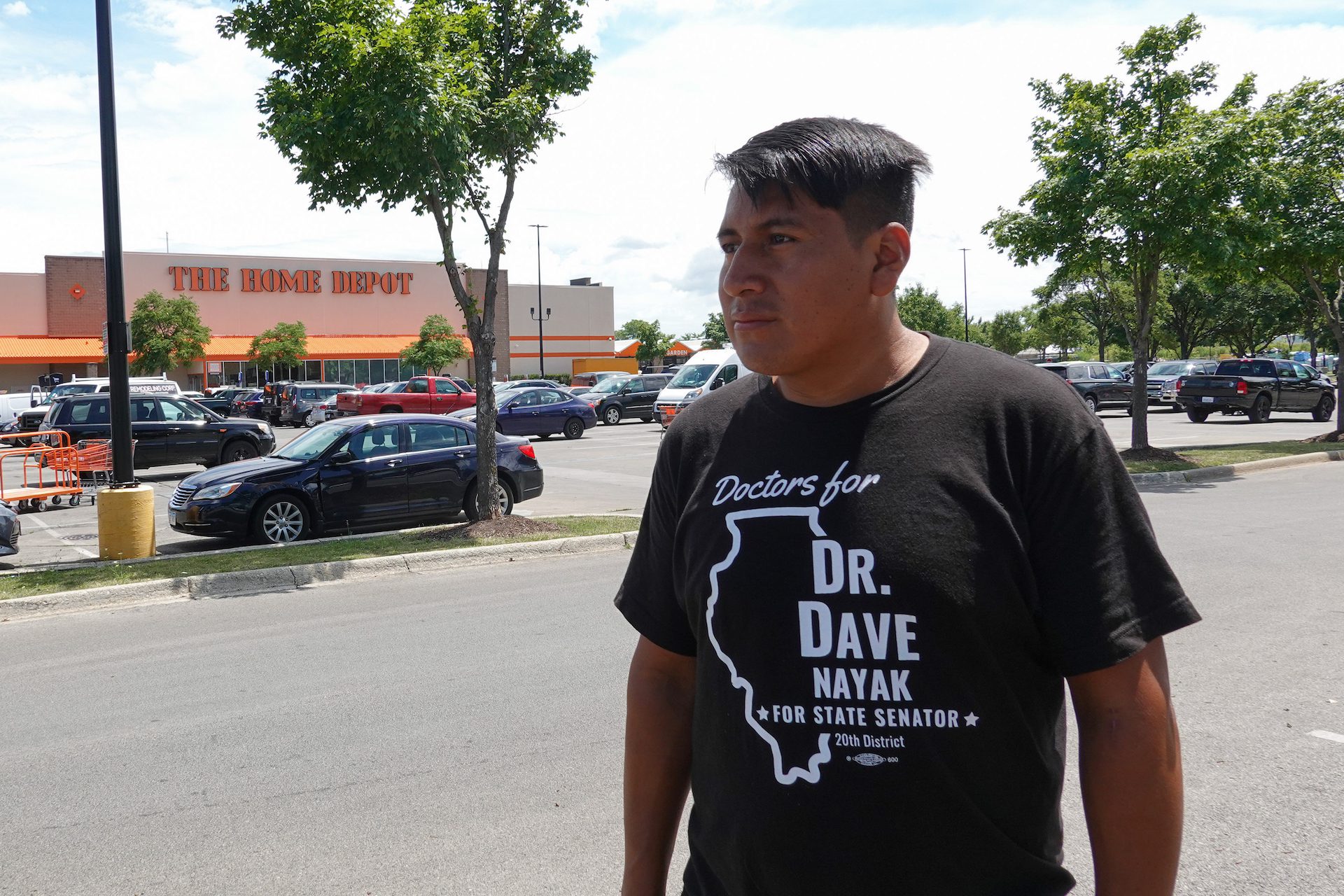
In Chicago — and other cities now home to immigrants from South and Central America — the scene is remarkably similar. Home improvement stores have long been the first and sometimes even the last place of work for immigrants. And now, they are where many of the latest arrivals stake out their futures as they wait out backlogged Immigration Court dates or work permission authorization. For those who arrived with nothing but dreams, it is where they scrape daily for their existence.
They face slim prospects and stiff competition among dozens and dozens of day laborers waiting and hoping for a chance to find any type of work.
At the Home Depot where Juan is waiting, security and police regularly push the workers back off the company’s property and onto sidewalks. But the workers slowly drift back onto the edges of the company’s property or bunch up, so they can be seen waiting to be hired.
Read More of Our Coverage
Day laborers dig trenches. They paint. They move furniture. They do construction and demolition work. They wash dishes. Some bring the skills they learned at home, and some come with only two arms and a strong back and hope that they get paid and not hurt and that there’s more work tomorrow. Few carry any tools. And some look like they are in their mid or late teens.
There are women, mostly older, sitting quietly among a smattering of teenage girls, and they huddle or crouch on the ground in groups, waiting for jobs mainly as domestic workers.
Pressing up against the windows or trucks, they make their deals in Spanish or a few words of English or sign. They usually don’t know where they are going, who they are working for, or what if any dangers or problems they will face. But it’s work.
After several days of standing on the streets and talking with handfuls of immigrants, they explained that the long time spent waiting for work in Chicago these days is due to more competition and fewer people needing them.
They also explain that day labor comes with heartbreak. Organizer Harold Jesus de Morales has learned this in the last eight months working for the Latino Union, Chicago’s oldest day labor organization.
And it clearly troubles him as he whips through recollections of what he has heard from the workers.
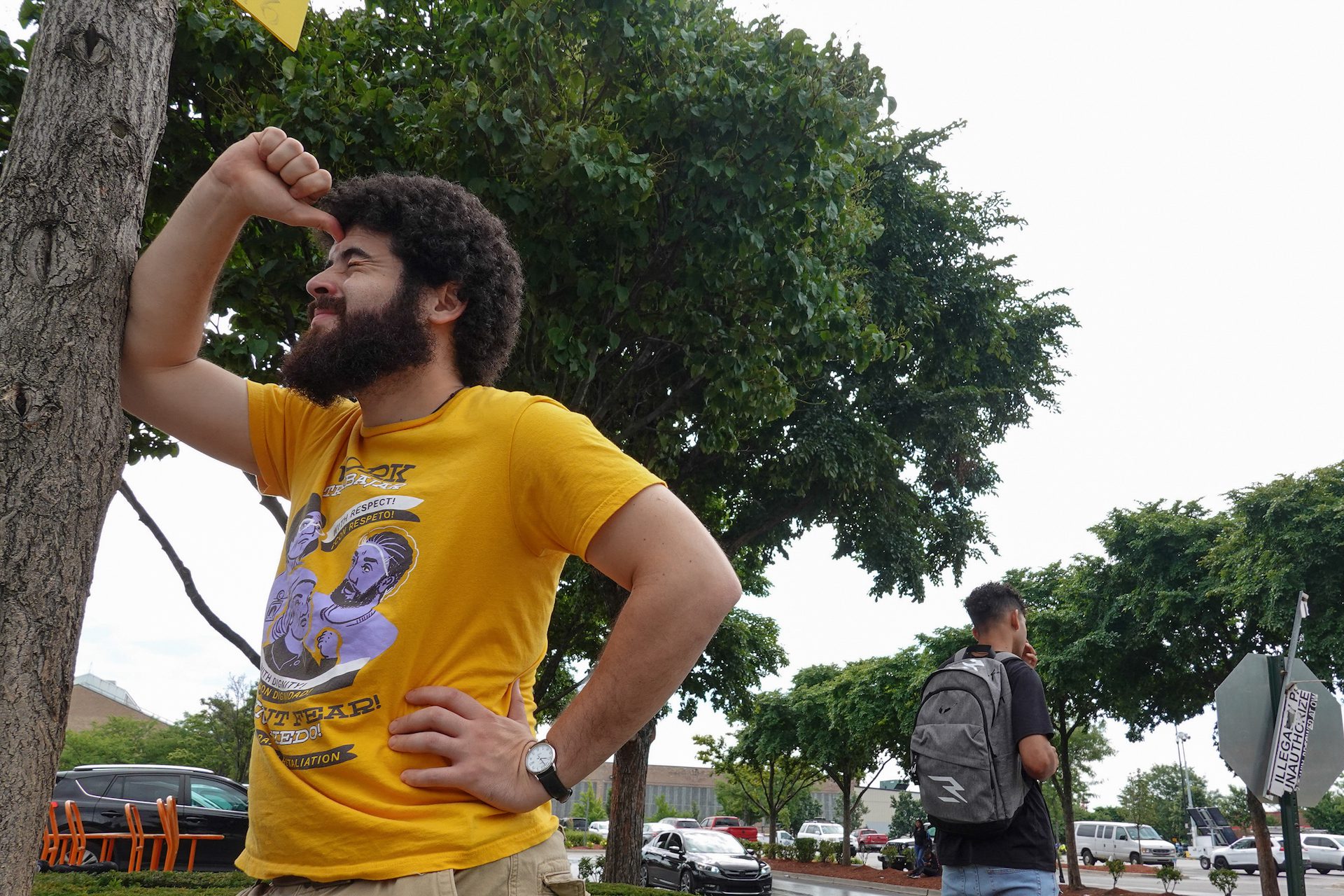
They are workers who told him how they were paid only $30 for a whole day’s labor instead of the $150 they say they should regularly receive. Or, they worked for a day and then were not paid and held at gunpoint and warned not to complain to anyone, or were taken on jobs for long stints across the country and not paid. “It’s like human trafficking,” he says.
“I’ve not met one worker who has not had their wages stolen from them,” said de Morales, 29, who is originally from Ponce, Puerto Rico. But the workers usually don’t complain “because they say they are immigrants and they don’t have rights,” he says.
But that is not true. They do have rights, he says.
Standing among a group of workers on the edge of a Home Depot at 45th and South Western Ave., he recounts the abuses they face, and the men nod in agreement. Then he tells them what they can do about it. One solution, for example, is to join his group, which can help them file complaints. (Membership for the group costs $40 a year. However, no one is turned away if they are unable to pay). He also urges them to take an English class that he can set up so they can learn their rights.
They can file their complaints about rights abuses with officials in Spanish, but English gives them a foot up in maneuvering daily, let alone helps them gain information that they may need later.
However, he later explains to Borderless reporters that winning their rights is challenging. There are too many complaints for his small agency to handle, the paperwork and reporting are too complicated for the workers, and the process takes too long.
Evelyn Vargas, head of organizing for the Latino Union, says she has “submitted a few complaints [to the Illinois Department of Labor] and haven’t had any that have been resolved.” One that she filed nearly three years ago still hasn’t resulted in the worker receiving a month’s wages that weren’t paid.
The state’s Labor Department has, indeed, received day laborers’ complaints about wage theft and “knows about the horror stories,” says spokesman Paul Cicchini.
However, acting on the complaints has been “problematic” if the workers do not know who they worked for the date and if they wrongly file under the state law dealing with day laborers instead of under the laws dealing with wage theft. Cases involving trafficking and gun threats should be directed to local police or federal agencies, he adds.
As a solution, the state has sponsored workshops with the day laborers through the Illinois Coalition for Immigrant and Refugee Rights, the Illinois Venezuelan Alliance, and the Chicago Workers Collaborative to “educate” workers on their rights and how to file complaints.
Amid the boredom and wilting heat, the workers don’t talk much about these problems, however.
Rather, they talk about the harsh realities of where they came from, how much they need to pay their rent and buy food, and, if lucky, whether they will be able to send money back home. Some say they were driven by strictly political reasons, some by the lure of the American dream, and some by both.
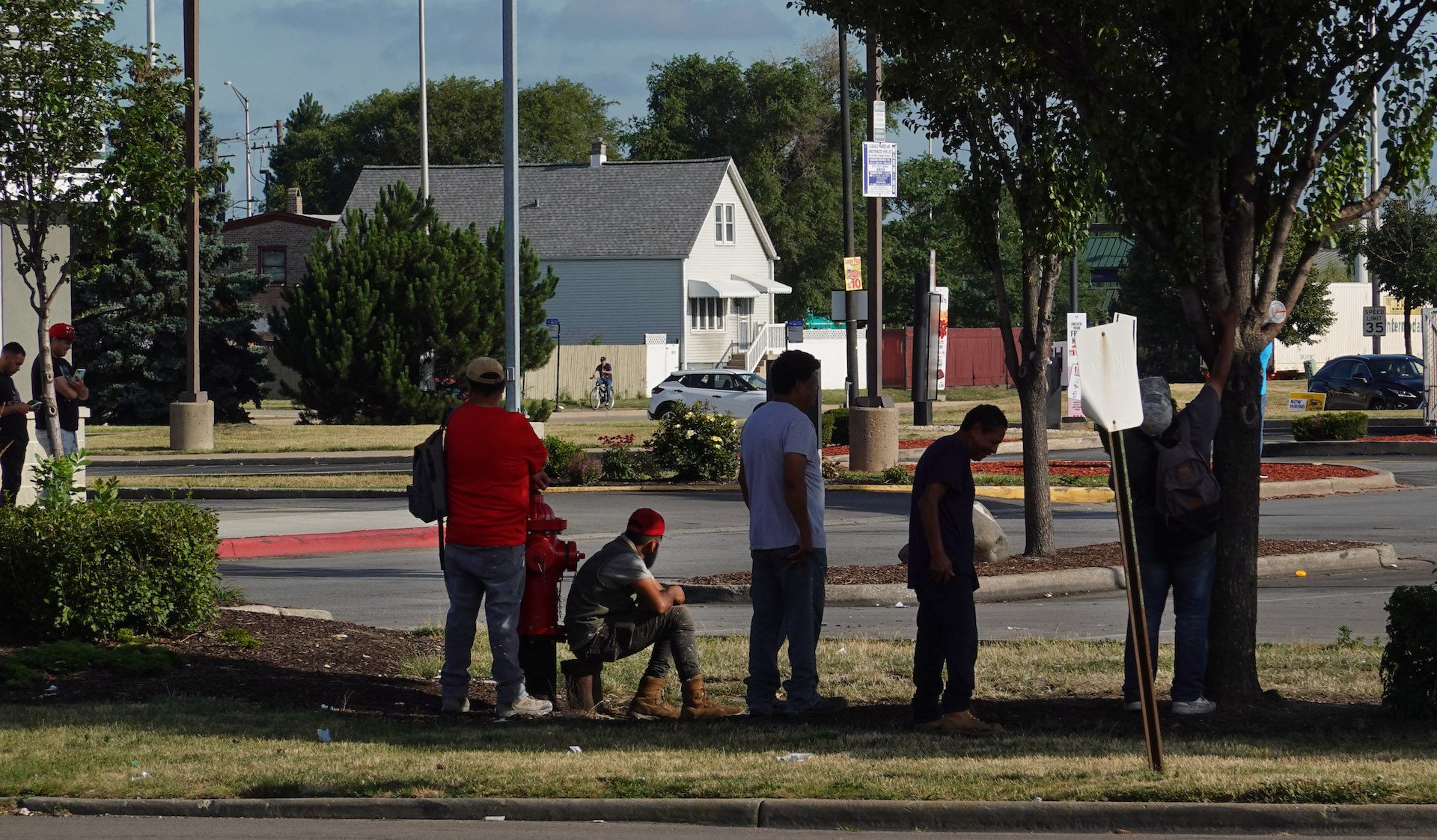
They talk, for example, about how Ecuador collapsed in the last few years into the hands of gangs and armed groups, and political instability on top of a shrunken economy.
Venezuelans talk about how Venezuela went through a long decline that made them more desperate as jobs vanished and incomes shrunk, and food lines grew. Those who spoke out against the government disappeared or suffered in other ways at the hands of the government and its allies.
Collectively, they explain how they made their way north, crawling and scratching their way through the horrors of Panama’s Darien Gap, a tropical jungle. They speak on how they had to pay money all along the route to coyotes or smugglers, corrupt police, drivers willing to take groups north while skirting police checks, and the hostels and businesses that live off the immigrant stream.
And so, they join the waves of poor or politically or socially endangered headed north toward the American dream.
The economic death of Venezuela’s economy sent Argenis on the road in 2018. He had taken part in protests against the government that put him in danger and sent him packing, the 37-year-old said, who asked only to be identified by his first name. His flight took him first to Peru, then to Chile, where making a living was easier. Without papers, however, he had to move on after three years.
Arriving in the US within the last year, he quickly made up his mind to end his immigrant wandering. That meant soon finding a lawyer and filing for asylum, which he did. Now, he awaits for permission to work. Asylum seekers can theoretically receive work permission 180 days after filing a complete asylum application. However, a flood of applications has created delays that the government has been struggling to deal with.
Read More of Our Coverage
The morning is nearly gone, and he is among the few waiting outside the Home Depot at 26th and South Cicero Avenue. There’s talk about moving on to other cities to find work. But one of the men shakes his head at the thought. He has heard about places in the U.S. that have passed laws, taken steps, or simply shared views that make immigrants like him feel unwelcome.
“I’m a Venezuelan and you come here afraid, so you don’t want to go to a place where you are afraid,” he says, and nobody disagrees.
A car pulls up, and the driver waves to the workers. The driver is instantly surrounded by several job seekers. Only one of them gets into the car. Argenis returns to the small group, still waiting for work. It is hot, and there’s no shade where he stands waiting.
Hector Salas is among a bunch of workers left behind waiting on the street just outside of the Home Depot at S. Western Ave. and 46th St. The 44-year-old from a city in north central Venezuela is not reluctant to talk about what made him into an immigrant.
Salas has not found work in about two months and said he does not want to risk acquiring fake papers.
In Venezuela, he worked in kitchens and a meat packing facility. But the work that filled him was his 14-year service as a pastor for an Evangelical church, where he had about 150 followers. He reached into his pocket to show his official pastor licenses.
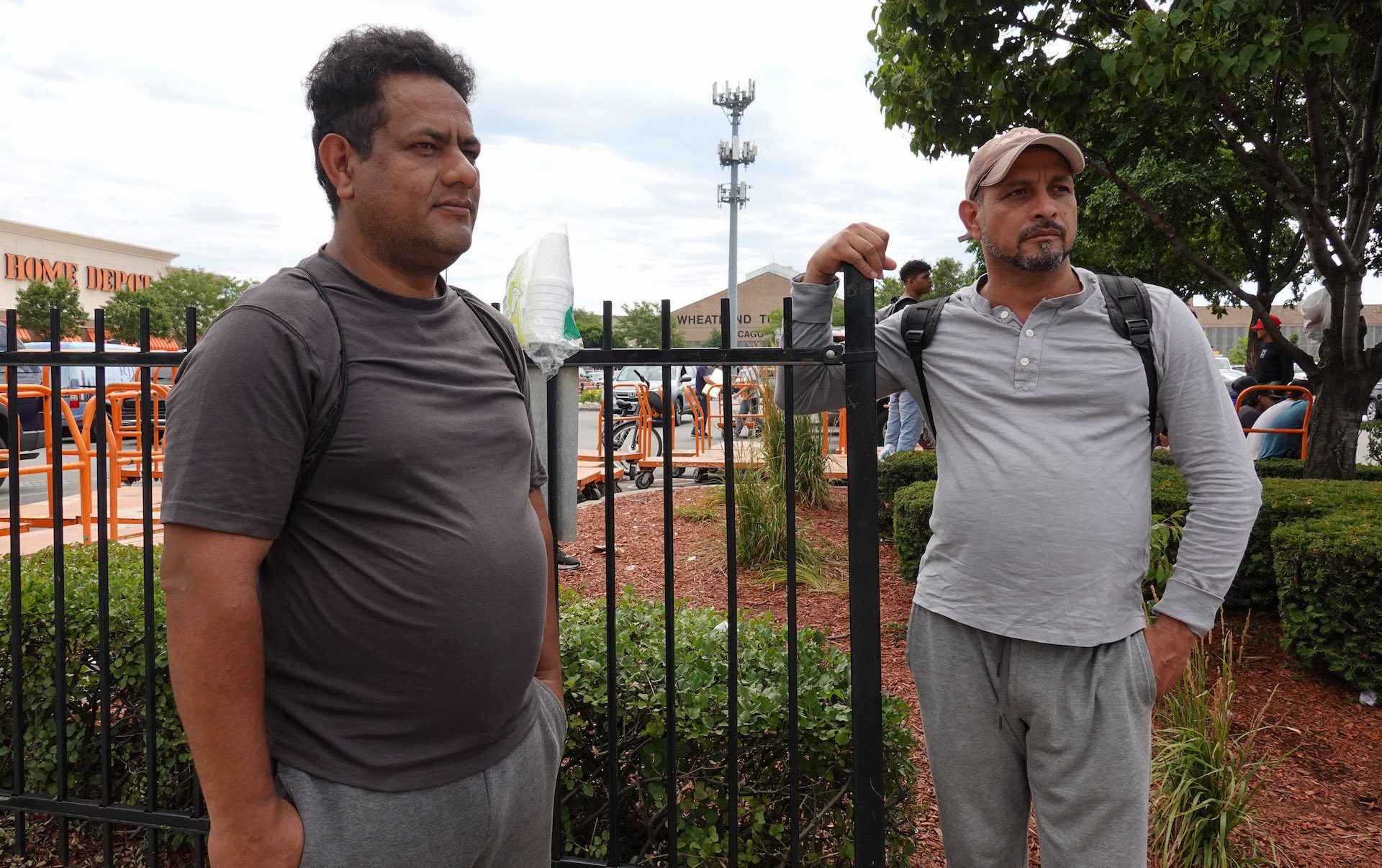
It was his role as a pastor and his link to a local radio station that shared his criticism of the government that sent him north, leaving behind a wife and two children. The government closed the radio station. One of his colleagues disappeared without information for his family and only emerged after 45 days, saying he had been kept all that time in jail. “There’s no public defender—nobody to help you. There’s only the government,” he says, shaking his head.
And then local officials decided to keep Salas and his family at home for several days without explaining why. He complained to local officials, but nobody could do anything. That’s when he decided to leave and make the trip all the way without a coyote to guide him. He had to; he says he didn’t have much money. He left his family behind.
After four months on the road and then three months waiting at the US Mexico border, he arrived in the U.S. With help from those he met in America, he found financial support for a lawyer, filed for asylum and now awaits a court hearing.
But the wait hasn’t been easy.
He lives at a refugee shelter, where he says he has met several deadlines to leave. He has not worked in two months, yet he comes every morning to wait with the others because he has nothing else to do, but he has hopes.
“It’s difficult coming here. It’s hard. You can always get fake papers, but I don’t want any problems.”
So how does he get by?
He smiles and, without saying a word, points his fingers skyward.
08/01/24: A clarification was added regarding union dues and membership.
